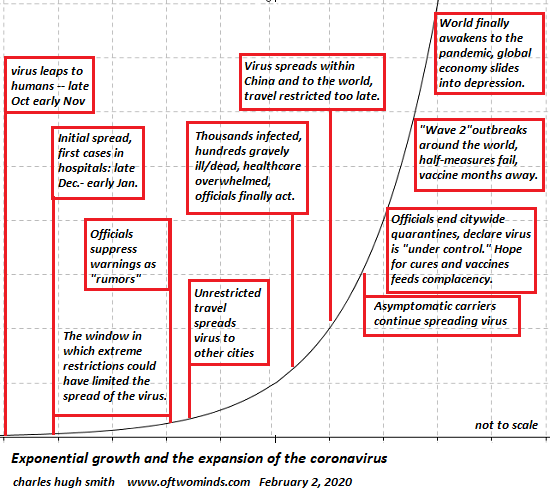
(Article republished from CharlesHughSmith.Blogspot.com)
Everyone who reckons that the lockdown is needless and more destructive than the pandemic that triggered it has to answer this question: then why did China lockdown half its economy?
The reasoning of those who reckon the lockdown is needless can be summarized as follows:
1. The lockdown is based on poorly executed extrapolations of faulty data; the death rate is much lower than expected, and most cases are mild or asymptomatic.
2. Therefore, the lockdown is doing far more economic damage than simply letting the pandemic run its course.
3. Alternatively, the pandemic and the lockdown are planned operations of elites, the goal being to further consolidate New World Order control in the hands of a few.
All of these rationales stumble on the question of why China locked down half its economy. It is a real stretch to claim that the Deep State et al. control China, therefore it's unlikely China's decision to lock down half its economy as the pandemic ravaged Wuhan was a U.S. Deep State operation.
As for the extrapolation of faulty data: what did the Chinese leadership learn that we don't yet know? How can we assume China's leadership over-reacted to faulty data in shutting down half their economy? More likely, they had the best available data and balanced the consequences of letting the pandemic run its course or accepting the immense economic damage of locking down most of their productive economy.
Why would China's leadership have accepted the staggering economic losses of lockdown if the situation wasn't catastrophically dire?
What other factors might have influenced China's decision to lock down its economy that we don't know? The true origin of the virus, perhaps? The true death rate in Wuhan? The actual number of dead piling up like cordwood in Wuhan?
If China's lockdown was a decision reached by its leadership based on information known only to them, then it follows that the information effectively forced their decision to absorb the enormous economic damage of a full lockdown as the lesser of two evils.
It is quite reasonable to assume China's leadership had the most accurate data available, and that they deliberated very carefully before choosing a response with such grave economic consequences.
Few commentators have speculated what the intelligence agencies of South Korea, Japan, Singapore and the Western nations might have discovered and shared with each other. China is not exactly a closed country, and there are ample intelligence-gathering opportunities via space-based assets, data collection and meta-analysis of that data, and so on.
It seems unlikely to the point of absurdity that all these intelligence agencies weren't collating data from every available source and making their own assessments of the risks of letting the virus run its course.
If the lockdown is needless and more damaging than the pandemic in the West, then that is also true in China. Those claiming the lockdown is a planned operation have to explain why China would follow the directives of a Western cabal: how would kowtowing to a Western run operation benefit China, given that the operation required accepting enormous economic damage?
Those claiming the economic damage is much worse than the relatively light casualties of letting the pandemic run its course have to explain why China's leadership chose lockdown. Given the extraordinarily high costs of choosing lockdown as the response, they must have had extremely sound reasons for choosing such a painful policy.
As many have surmised based on evidence, it seems beyond reasonable doubt that the actual death toll in Wuhan was somewhere between 10 and 100 times the official counts of around 2,500. Would China's leadership shut down most of its economy for a run-of-the-mill flu that caused a mere 2,500 deaths in a nation of 1.3 billion people? It seems unlikely.
As many commentators have pointed out, China's leadership is drawn from the ranks of technocrats, not lawyers. It's likely technocrats can grasp the consequences of data presented to them and make rational extrapolations from that data.
If Covid-19 has a very low death rate and therefore wouldn't disrupt the economy any more than a run-of-the-mill flu, then why did China's leadership pursue such an extremely costly policy as lockdown? Those claiming lockdown is an over-reaction are also claiming that China made a terrible policy mistake in choosing lockdown.
But since the data that decision was based on is not known, then we cannot know if lockdown was the best available option or perhaps the only available option.
It's likely that the intelligence agencies of South Korea, Japan and the Western nations probably have collected data that's confidential. It's also likely that they've shared data and that they've informed their political leaderships of the consequences of various policy choices.
As a thought experiment, let's say 250,000 people died in Wuhan, not 2,500. Is lockdown still needless? Based on what assumptions about the economic damage inflicted by deaths on that scale?
Recall that the initial deaths and related costs are only the first-order effects; policy makers have to consider the second-order effects--consequences have their own consequences. For more on this, please review my COVID-19 Pandemic Posts dating back to January 24, 2020.

Read more at: CharlesHughSmith.Blogspot.com
Please contact us for more information.























